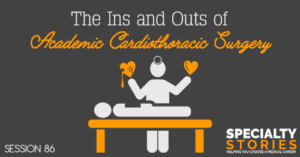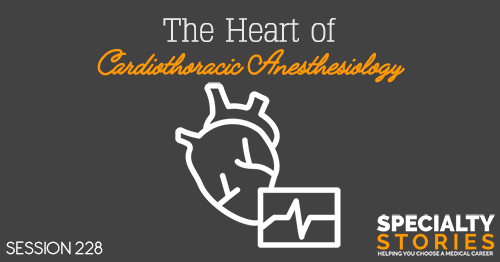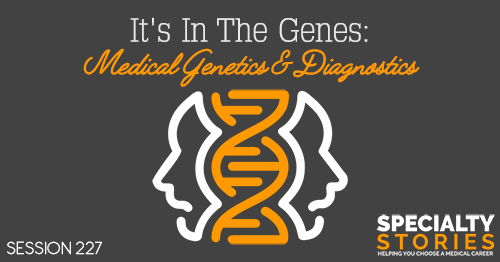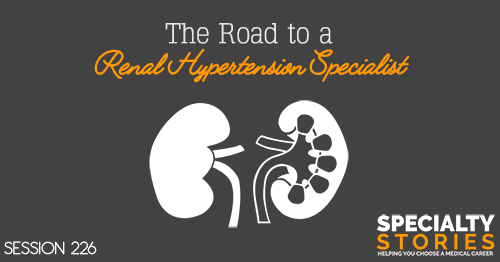Apple Podcasts | Google Podcasts

Session 86
Dr. Joseph DeRose is an academic Cardiothoracic Surgeon. Today, he discusses the length of his training, the competitiveness of his field, and why he loves it!
Meanwhile, please don’t miss all our other podcasts on the MedEd Media Network so you can get all the resources you need in every step of the way towards finally becoming a physician!
[01:00] Interest in Cardiothoracic Surgery
As a third-year medical student, Joseph liked almost everything. He even thought he was going into interventional cardiology. But he realized it’s a medical specialty which means doing three years of medicine and three years of cardiology and then interventional cardiology. But he realized he liked surgery more than medicine.
At that time there was no direct pathway to cardiac surgery. He went to general surgery training and found there were a lot of areas in surgery that he liked, but still much very interested in the heart. After doing multiple rotations, he decided to do cardiothoracic surgery based upon the thought process built around whether you can’t be happy doing anything else.
[03:45] Traits that Make a Good Cardiothoracic Surgeon
First, you have to be interested in acute care. Most of the cardiac surgery is care that’s high intensity but very focused on temporal relation. You’re taking care of severe and critical issues but you’re taking care of them in small periods of time. So you have to like being in a hospital and critically ill patients. You have to also like other things because cardiac surgery is not just a mechanical field. You really have to enjoy pathophysiology and a bit of cardiology since a lot of patient care goes on.
Because cardiac surgery is a hospital-based practice, there are other things that go into being a cardiac surgeon regardless of whether you work for an academic institution or private practice. This includes enjoying teaching. There’s constant education going on even if you don’t have a fellowship. You’re educating PAs, nurses, perfusionists, and junior faculty.
Apparently, research is an intimate part of the field. This occurs even if you’re not in an academic program. Cardiac surgeons are frequently involved in clinical trials and clinical research even if they’re not academic, per se.
If you like those three, this can be a great field for you. In terms of traits, you have to have a lot of mental and physical stamina to be a cardiac surgeon. You have to be even-keeled as things can get very up and down. So you have to be able to take different things as they come.
Going into this, Joseph initially considered vascular surgery for some time and to the last minute, he decided it wasn’t for him.
[07:14] Types of Patients
Coronary artery disease is the most common he sees but there are many ways to take care of that now – regular, conventional bypass surgery, stents, robotic surgery, minimally invasive surgery.
Another common disease would be valve problems – aortic valve, mitral valve, leaky valves, stenotic valves, etc. There are situations where patients can be offered various options such as open surgery, minimally invasive surgery, transcatheter, structural heart interventions.
Other areas of specialty include aortic diseases involving aortic dissections which are a high-intensity part of the pathology. Heart failure is another common disease among patients which includes things like heart transplantation and artificial hearts.
Cardia surgeons are sort of tertiary or quarternary referrals. So patients have typically seen the medical doctor or cardiologist before they’re being called. However, even if you’re called with a specific diagnosis, that doesn’t always mean the diagnosis is completely worked up or correct. It doesn’t mean that the person has been completely evaluated as to whether they’re a potential candidate for different interventions.
The evaluation of cardiac surgical patients for the cardiac surgeon is much different than any other surgical specialty because we’re expected to evaluate every part of the patient’s body. That said, appreciating the subtleties of every patient is what makes you successful or not. And that’s what makes it so fun as well.
[11:30] Typical Day
As an academic heart surgeon, Joseph does research and runs the residency program. He also has a very busy clinical practice and does about 300 cases a year. A typical day would be getting in at 7 am working on academic things before going to the OR. He also makes rounds with the whole team and sees all the patients in the ICU and the floor before going to the operating room, which starts at about 7:30 am. They can have 1-3 operations going simultaneously, being involved in the OR most of the day and being available to respond to other issues and concerns in between operations.
Once out of the operating room, Joseph gets on his computer. At the end of the day, they round up with fellows and PA’s and see patients they’ve just operated on or patients that are having issues throughout the day. They also see patients that they’ve gotten called about for consultation and assess them to see them if workup is needed or surgery. Then he could also be on conference calls for clinical research trials he’s involved in a couple of times a week. He may also go to administrative type dinner whether it’s for planning or recruitment, etc. A full day for him, yet enjoyable.
[13:30] Taking Calls and Work/Life Balance
Joseph points out that call is something that every surgeon needs to take probably for the rest of his life. Taking calls for them is a bit unusual because they cover things like regular bread and butter heart surgery as well as heart transplantation, lung transplantation, aortic dissection, ECMO (extracorporeal membrane oxygenation). Generally, they take about 6-8 calls a month including one weekend.
In heart surgery, it involves making rounds on the patients in the ICU and the floor every day of the weekend. They also cover emergencies that occur at night and when they do, the operations can take long for about 6 hours.
Having been in practice now for 17 years, Joseph is married to an internist and now have two children, 21 and 18. He coached his son’s soccer team and baseball team since he was in 3rd grade until 8th grade. Then when he got to high school, he played varsity lacrosse and went to every game whether home or away. He did all this with planning. And it can always be done. He also coached his daughter’s soccer team. Moreover, Joseph is lucky to be working in a big group of people he’s known for a long time and they’re all very supportive of each other’s family life.
[16:45] The Residency Path: Traditional
The traditional path requires four years of medical school and then you apply to general surgery residency, typically taking 5 years. With most cardiac surgeons of today, they’d all spend an additional year of research in cardiac surgery because the application process is incredibly competitive.
A lot of applicants that are now going through the traditional path mostly don’t do extra research. But by the time you get to your fourth year, you have to apply to either a 2- or 3-year fellowship. That’s in cardiothoracic surgery. So that’s 4 years of medical school, 5 years of residency, and 2-3 years fellowship.
Joseph recommends that even though you’ve done the traditional path, spend an additional year thereafter focusing on a super fellowship in a higher intensity-focused area. For example, do an extra year in heart transplantation or if you want to do thoracic surgery, do an extra year of minimally invasive thoracic surgery for instance.
In cardiac surgical fellowship, you have to train for 2-3 years in three areas: adult cardiac surgery, general thoracic surgery (including lung-esophageal surgery), and pediatric heart surgery. This is a lot to learn in a short period of time, hence, Joseph recommends an additional year. That’s a total of 8 years in training on the traditional pathway.
[18:25] The Residency Path: The I-6 Program
In 2012, there were less and less applicants for cardiac surgery and one of the reasons is the sacrifice it takes to be a heart surgeon. And a lot of people were less inclined to make those sacrifices. The second reason is the reimbursement concern where people didn’t feel they were well-compensated. This prompted the association to develop an I-6 program where you apply directly out of medical school and you’re being matched into cardiac surgery. You still do about 3 years of the traditional general surgery training and within the final three years in cardiac surgery includes weeks and months of specialties important for cardiac surgery such as interventional cardiology, echocardiography, perfusion. This cuts off two years the training length although many of the programs also do an additional year of research. Those that finish the I-6 program will also take an additional year of super fellowship training.
The I-6 application process is more competitive because of a much larger group of people looking at it with a smaller number of spots. There are about two applicants for every spot. To be competitive, you have to have great grades, with at least one or two publications already and have done some research in medical school.
You don’t need as high a qualification coming from a general surgery program. That being said, there are still some excellent traditional training fellowship programs as well as I-6 programs that aren’t so good. This is something students should consider as well. Interestingly, of the people that don’t match in the I-6 program and go to general surgery, only about 5% of them that while they’re in general surgery, decide they’re going into cardiac surgery.
[22:52] Super Fellowships
For instance, you’ve done three months of congenital heart surgery and like it, you can’t be a pediatric heart surgeon. You’ve got to spend an extra year doing congenital heart surgery. If you’re a thoracic surgeon and non cardiac thoracic surgeon, there are super fellowships in any number of specialty areas for that. It could be an extra year in surgical oncology or in minimally invasive esophagectomy, or an extra year in lung failure or lung transplantation. So there are a number of areas where you can get additional training. In adult cardiac surgery, the major ones would be another year in adult heart surgery. But the three most common ones are heart transplants, minimally invasive heart surgery and mitral valve repair surgery.
[24:10] Challenges Osteopathic Students Should Overcome
An osteopathic medical student has to go into a general surgery residency training program. It can be an osteopathic training program but must be approved by the ACGME. However, if you do that going through the traditional pathway, there are no obstacles. If you’re a good candidate, you can absolutely become a cardiac surgeon. In fact, in their training program, they have several DOs over the years and many of them have been outstanding. However, this is not offered in the I-6 pathway.
[25:15] Working with Primary Care Physicians and Other Specialties
Primary care has changed a lot over the years. Internal medicine has been very stratified with inpatient and outpatients where they no longer have their own individual patients. Because heart surgery is so much of an evaluation process that includes the entire patient, cardiac surgeons need help in evaluating their patients for their end-organ dysfunction. But a lot has been fractionated where they’d call the specific specialties. But Joseph points out that this is not so helpful since each specialty will focus on their specialty area. What you need is someone like the heart surgeon like an internist who’s evaluating the whole patient and all of their medical problems to assess whether an intervention is going to make them either live longer or feel better. And this can still be improved upon, Joseph believes so.
Other specialties they work closely with include cardiology, GI, pulmonary, and renal to help manage patient’s post-op. There are people in his team where each one may direct a program upon which, you’re almost always directing that program with a medical cardiology person specialized on the medical side.
[27:45] Special Opportunities Outside of Clinical Medicine
Cardiothoracic surgeons are a totally different breed. From the beginning of your training, you’re taught that it’s not just about doing surgery but it’s also about being a leader and learning how to talk publicly and learning how to expand your horizons. Most cardiac surgeons aspire to do other things such as politics, media, administration or lead a department. So there are immense opportunities out there but a lot of it has to do with the training.
Moreover, Joseph points out that training is really hard. Things have changed with hour restrictions but it’s part and parcel of all of it in making you think about not just about being a technician.
As to gender demographics, Joseph seems not to notice any division as people are going into fellowship. He recently looked at the applications and there were 40% women and 60% men.
[30:45] Two Areas Not Being Taught in School
Joseph says that when you go through medical school and in training, we’re not really taught how we exist in relation to the real world. We only know how we exist within the confines of our training programs. There are a lot of things that you need to learn by mistake to figure out how to function better the next time. This is common in areas like the medical-legal area. It has nothing to do with mortality/morbidity or with right or wrong. So you have to learn how to appropriately document what you do in the chart to protect yourself. The other area is on the business end.
Not having an idea about how the business of medicine works puts you at a disadvantage when you’re trying to negotiate your first contract, or realize what’s important to the hospital versus what’s important to you from a financial standpoint.
In cardiac surgery, though they get exposure to outpatient medicine, it’s only by experience that you start figuring out all the interpersonal dynamics that occur when you see a patient in the office or on the floor for heart surgery. You need to understand what the interplay is between a patient’s family members and what you’re going to talk to them about. You have to understand the reactions of patients when you talk about life and death.
[33:44] Least and Most Liked About the Specialty
Joseph loves that it’s something new and different everyday and how it’s all a dynamic process. There are so many things that go on beyond just the operation and you have to be very intuitive and be very careful about when it comes to managing patients after surgery. He also loves the educational and research parts of it. Many students do cardiac surgery for the excitement, but after a while, surgery becomes the easy part as it can get to be a routine. But it’s the different interplays in patients and each pathology are just amazing. Ultimately, he loves being there for the patient in their most trying times, whether that’s saving their life or sometimes helping them die.
What he likes the least is the litigation portion of it. There are lots of lawsuits in cardiac surgery and there’s nothing more painful than to have to go through that, says Joseph. Though 95% of all lawsuits get dropped and 5% just go through the trial and ever settled, it’s a part of life and it’s something any doctor wouldn’t want.
[35:45] Turf Wars with Other Fields
Joseph believes you have to take a broader perspective on it. He has been seeing and hearing how stents are going to take away coronary bypass grafting. But cardiac surgeons are always intimately involved with new technology whether on the research end or on the clinical end. New developments are in terms of the structural end and cardiac surgeons will continue to be involved in, as well as heart failure area with all the devices coming out. They’re becoming less and less invasive, helping more and more patients.
That being said, Joseph definitely sees a brighter future for cardiac surgery. In terms of job perspective, there’s a lack of cardiac surgeons going into the field about 5-10 years ago. A lot of the surgeons retiring in the last 5-10 years has left a huge opening for cardiac surgical positions. So getting a job in cardiac surgery is much easier now.
[38:05] Final Words of Wisdom
Finally, if he had to do it all over again, Joseph would still do the same. He loved what he does and still loves coming to work everyday. He thinks there is no other job that’s as exciting as they do but you have to have the right personality to take on the challenges that it brings. Yes, you get to save lives but people die as well so you have to be able to deal with that.
Ultimately, he wishes to impart to students that medicine is the noblest of all professions. It’s something you have for yourself forever. It is not a job. In cardiac surgery, Joseph explains it’s the same kind of discussion, except that it’s on steroids. People may ask you why you want to sacrifice your life to do those kinds of things as you’re not going to make as much money or things are going to be hard and there are lawsuits. But you’re doing it for something else. You’re going into it because you love it and if you do it this way, there’s nothing more gratifying than this.
Links:
SEARCH SITE
LISTEN FOR FREE











